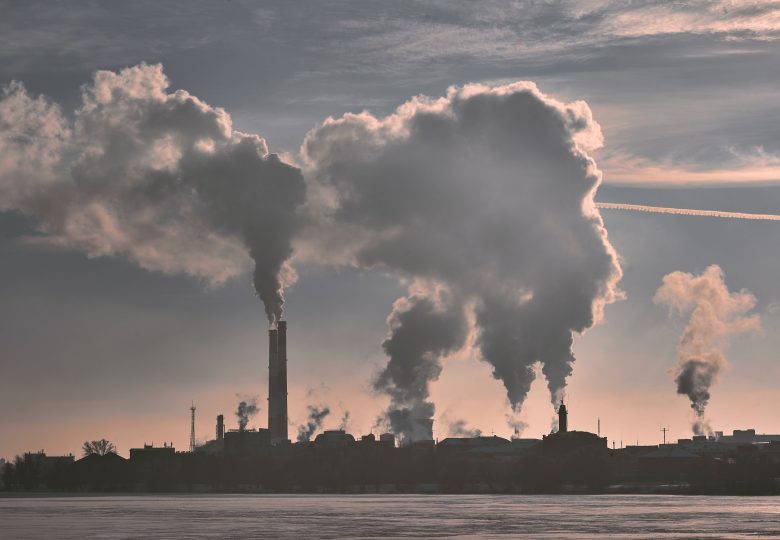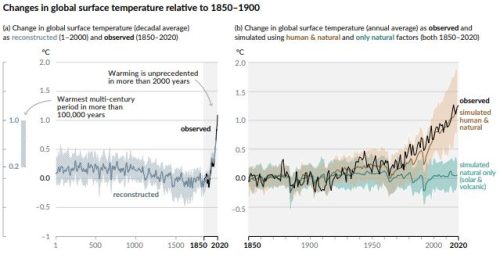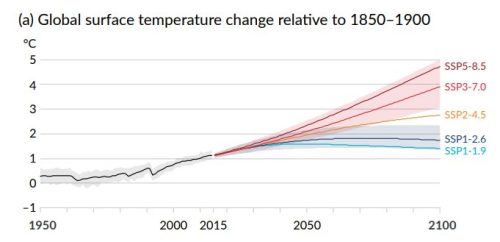Climate issues
We will look into IPCC-report, read the science behind CO2, seawater, temp rise etc

Climate facts from the IPCC-report aka AR6
I will give you the short version here, so you don’t need to read it all, but I recommend looking into the report for policy makers, it is slightly easier to read before you go to sleep…
Its written and approved by several hundred highly regarded scientist around the world, and thousands has gone through it afterwards. Yes, there might be possible improvements and suggestions towards it, but the framework and conclusions doesn’t change. Here I list the most certain effects and try to avoid those changes that have a lower statistical proof of being correct. I have a blog where I go through the most trusted facts about climate change from the report in more detail. Here I will try to take out the more special scientific wording as well and interpret it to my best knowledge.
- First thing they state is that there is no doubt that we humans is the main cause for the sudden increase in CO2, methane and other GHG and these gases are the main cause for the temperature rise
- There are also effects that has caused a cooling, but this is much smaller than the increase so we have contributed to about 1C increase over just the last decade, compared to
1850-1900, which is what we compare against - In 2019 atmospheric CO2 concentrations were higher than at any time in at least 2 million years, and concentrations of CH4 and N2O were higher than at any time in at least 800,000 years. Since 1750 we see increases in CO2 (47%), CH4 (156%) and N2O (23%)
- It is certain that hot extremes (including heatwaves) have become more frequent and more intense across most land regions since the 1950s
- The frequency and intensity of heavy precipitation events have increased since the 1950s over most land area
- Human influence is the main driver of the global retreat of glaciers since the 1990s
- It is certain that the upper ocean around the world (0–700 m depth) has warmed since the 1970s and human influence is the main driver, heating the ocean will expand it, like anything else you heat up
- Global sea level increased 3.7 mm pr year between 2006 and 2018, close to 5 cm in total, not so much, but in less than a 100 years it will easily be 50+ cm.
IPCC report PM

Here you see the sudden increase in temperature the last 150 years
Climate futures from the IPCC-report
Still from the report for policy makers, the chapter of how they see the future in different scenarios. Where they look at 5 scenarios, with different levels of GHG emissions, high, medium and low more or less. The low models expect us to go down to zero CO2 by 2055 and 2075 (which might be impossible, but we might cature CO2 in the future and driver our net to zero). Then they add these to models worked on by the World Climate Research Programme.
- Global surface temperature will continue to increase until at least mid-century under all emissions scenarios considered. Global warming of 1.5°C and 2°C will be exceeded during the 21st century unless deep reductions in CO2 and other greenhouse gas emissions occur in the coming decades
- There are also effects that has caused a cooling, but this is much smaller than the increase so we have contributed to about 1C increase over just the last decade, compared to

So here you see that even the most optimistic scenarios still ends up with 1,5 to 2C warmer, but the lower we can keep it the less effect it will have on nature. There is no absolute threshold temp, but there might be tipping points in there. What will happen with extreme weather if we go to the medium scenario is hard to tell, but it is fairly obvious that it will worse than it is.
- Global surface temperature will continue to increase until at least mid-century under all emissions scenarios considered.
- With every additional increment of global warming, changes in extremes continue to become larger. For example, every additional 0.5°C of global warming causes clearly discernible increases in the intensity and frequency of hot extremes, including heatwaves (very likely), and heavy precipitation (high confidence), as well as agricultural and ecological droughts30 in some regions (high confidence).
- Global warming will further intensify the global water cycle, including its variability, global monsoon precipitation and the severity of wet and dry events.
- Many changes due to past and future greenhouse gas emissions are irreversible for centuries to millennia, especially changes in the ocean, ice sheets and global sea level.
- Mountain and polar glaciers will continue melting for decades or centuries (very high confidence). Release of carbon following permafrost thaw is irreversible.
- Sea level will rise for centuries to millennia due to continuing deep-ocean warming and ice-sheet melt and will remain elevated for thousands of years

The different scenarios, if we keep overspending and pumping out GHG we can increase the temp on the planet by 3-5C before 2100.
We don’t know if there a tipping points in here that will make it even worse and in particular regions already dry or hot will feel the consequence immediately.
We cannot risk this, it would lead to areas not being inhabitable and a mass migration of people. Rising seawater, heavy rain and floods doesn’t help either.
we cannot hope that continuous economic growth will sort this out, yes there could be new technology, but we can’t wait for it. And the population will increase so we should be able to use less resources per person so we can actually support the number of people we will be in the near future.
